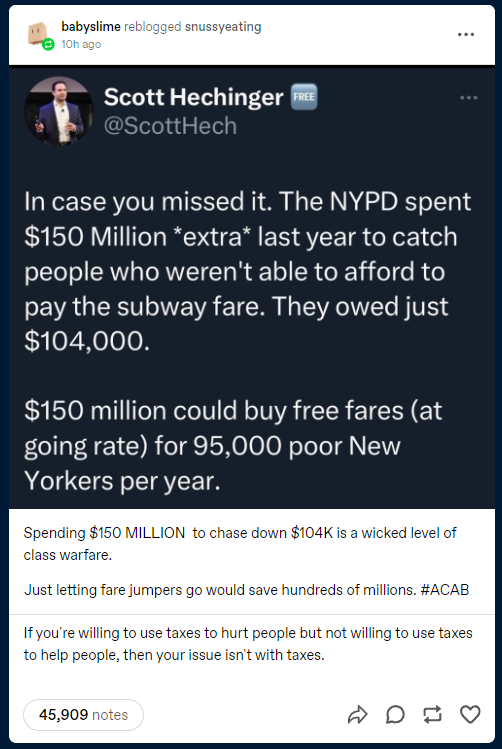this post was submitted on 14 Feb 2024
1577 points (97.1% liked)
tumblr
3448 readers
289 users here now
Welcome to /c/tumblr, a place for all your tumblr screenshots and news.
Our Rules:
-
Keep it civil. We're all people here. Be respectful to one another.
-
No sexism, racism, homophobia, transphobia or any other flavor of bigotry. I should not need to explain this one.
-
Must be tumblr related. This one is kind of a given.
-
Try not to repost anything posted within the past month. Beyond that, go for it. Not everyone is on every site all the time.
-
No unnecessary negativity. Just because you don't like a thing doesn't mean that you need to spend the entire comment section complaining about said thing. Just downvote and move on.
Sister Communities:
-
/c/[email protected] - Star Trek chat, memes and shitposts
-
/c/[email protected] - General memes
founded 1 year ago
MODERATORS
you are viewing a single comment's thread
view the rest of the comments
view the rest of the comments

Getting back into economics in a few weeks, sounds like a great starting point to review and get my head back into it. Disclaimer- I am half asleep.
You are discussing MR vs R, but wording is confusing. You are saying spend a dollar to get 0.10, not spend a dollar to make 1.10. Spend a dollar and profit $0.1 - good. Spend a dollar and get a dime - no.
A common mistake for those who learn econ - especially first year - is that it is taught in isolation. Set price for profit max, trade increases productivity and makes the average better - loss>profit shut something down. But it doesn't teach the wider considerations - people who are affected, long term run v short term.etc.
In this example, and I don't have the numbers:
what is the profit, and what are the fixed costs?
what long term revenue is being lost, what else will be lost when it isn't prosecuted?
what message does doing nothing send to those paying. What other behaviors are these non payers displaying?
what is the cost of a lawful and ordered society?
does it need to be profitable, does police action only matter if it makes money, or is it a cost to service?
what equipment, training and experience did law get to do this, and can it be used elsewhere? What systems were put in place (security.etc) that supports other practices.
Make no mistake - seems well excessive. But there is a wider consideration.
this same question can be asked of the MTA itself.
I am by far, not an economics major. I took a few courses, that's all. I know more about it than the average, but not nearly enough to make a career from it.
Regardless, I appreciate the comment. I'm not sure what else to say besides thank you.
Neither- business major and been tutoring 1st year economics for the last two years or so.
As I say, it's a common mistake. We teach for the test, theory and how to apply it in a business context but it doesn't take into account reality and wider issues... that's later on.
Not a problem - always happy to talk with people who want to discuss rather than argue.
I'm always a fan of discussion. I'm also a fan of being corrected constructively.
To be fair, my understanding of economics, while it may be better than most, is all based on my college courses from more than 10 years ago. It stuck with me, and has helped to guide a lot of decision-making. I rarely buy the cheapest option when I need something, and spend time weighing the benefits of options to try to find something that I believe will provide a low TCO and high ROI.
Of course my needs are fairly simple compared to the complexities of businesses and public facing services. The exercise allows me to stretch my economics skills a little and I enjoy it for the most part; needless to say, I'm a bit rusty on the specifics.